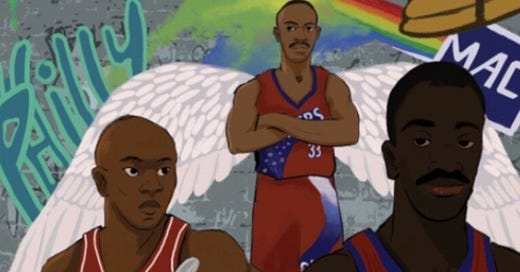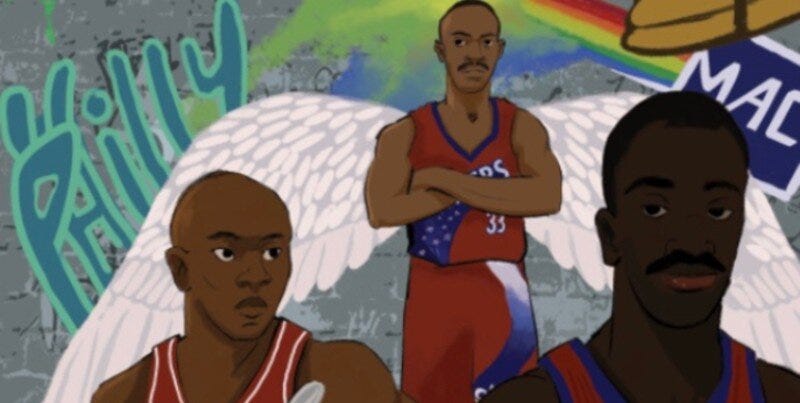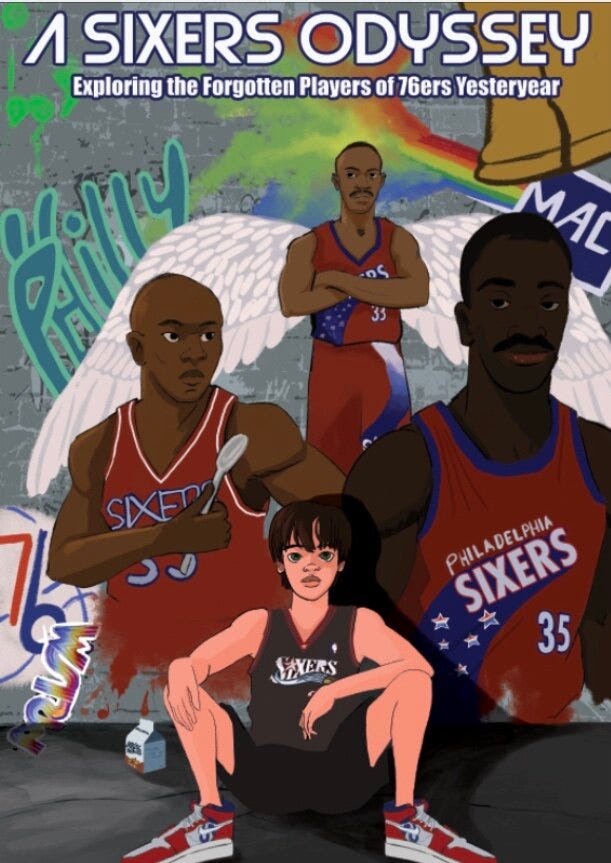Talking With the Legendary Dave 'Where Is Ben Rivera' Rueter About His Book of Forgotten 76ers, 'A Sixers Odyssey'
The Ricky really began here.
Andrew Unterberger is a famous writer who invented the nickname 'Sauce Castillo' and is now writing for The Rights To Ricky Sanchez, as part of the 'If Not, Pick Will Convey As Two Second-Rounders' section of the site. You can follow Andrew on Twitter @AUGetoffmygold and can also read him at Billboard.
Andrew's writing is brought to you by Kinetic Skateboarding! Not only the Ricky's approved skate shop, but the best place to get Chucks, Vans, any apparel. Use code "DAVESILVER" for 9.1% off your order.
In the culture of Process Trusting, no writer has better served to document the before-times like Dave Rueter, better known to many fans under his old blog name, Where Is Ben Rivera (WIBR for short on Twitter). While other writers were still fetishizing Iverson and the '01 Sixers, Rueter's bread and butter (on both his own blog, and eventually as a writer for Sixers hub Liberty Ballers) came with the Doug Moe and John Lucas eras, when the 76ers were fielding teams only a mother could love and only her bored kid could watch. Whenever I wanted to write about the '90s Sixers for my old gig at The 700 Level -- hell, when I wanted to write about any Philly sports team from the pre-World Fucking Champs era -- Dave was always my first call, to provide necessary wisdom and perspective on the likes of Scott Williams and Rob Ducey.
Now, largely as a result of excessive pandemic-enforced downtime, Dave has written his opus: A Sixers Odyssey, 265 pages of odes to 76 individual Sixers from days of yore. Appropriately, beloved stars like Iverson, Barkley and Erving are not featured in the book -- nor are Process icons like Embiid, Covington, McConnell, or any player still hooping in the Association -- so that such past luminaries as Greg Grant, Jumaine Jones and Shavlik Randolph can be sure to get their due. The book is a hilarious look back at the players who have defined Sixers superfandom over the past 30 years while remaining largely if not totally anonymous to the public at large, delivered through Rueter's singular perspective, voice and memories, halfway between James Joyce and Harvey Pollack.
Before announcing A Sixers Odyssey on Twitter today, Dave once again agreed to answer some questions for me over email -- this time, more about his book and his own history than about Mark Hendrickson and Omar Daal. Check out our conversation below, and pick up a copy of his book here immediately afterwards.
First off, I have to ask -- do you consider "Where Is Ben Rivera" to be a spiritual predecessor to "The Rights to Ricky Sanchez," as another branding reference to a marginal athlete of Philly sports past, whose name requires at least a half-minute explanation to any non-insane person?
I’d like to think so. If marginal athlete-inspired mediums were, say, Green Day, RtRS is probably the Dookie album. Critically acclaimed, mainstream popularity, etc. But I’m very comfortable in being Kerplunk if you want to pencil me in there.
You wrote for Liberty Ballers during the blog's first and arguably truest Golden Age, under the watchful eye if not direct tutelage of one Michael Levin. Any good Mike stories from those days?
The first time I met Mike was in Vegas for Summer League back in 2012. The Sixers weren’t even there – they had just played in the lame Orlando Summer League - but who was I to turn down three days of blackjack and Luke Zeller?
Someone had organized a game between SB Nation and ESPN’s blog, TrueHoop. It was all very official -- there were refs, a scorekeeper, a plethora of 20-second timeouts at our disposal. It was a pretty big deal. Anyways, Mike’s game was/is a cross between Evan Turner and Bo Outlaw. My memory is a bit hazy, but I think Levin finished with 8 points (2-11 from the floor; 4-19 from the foul line) and 8 boards. His preferred shot was contested and from sixteen feet.
Also, Mike would’ve maxed out Andrew Bynum up until 2019.
You talk in your book's intro about the validating effect of folks commenting on your early forgotten-player blog posts just to say, "I remember him." What is it, do you think, about the shared memory of a largely unremarkable sports career that's so strangely powerful?
It's like an exclusive club, you know? Like a bouncer checking IDs at the door. “Oh, you remember Vonteego Cummings? Cool, you’re good. Head on in. Coat check is to your left.”
It weeds out the average fans from the diehards and True Hoopers™. If you attend a Sixers game and see fifteen people in an Iverson jersey and one in a ‘95 Dana Barros All-Star kit, who are you gonna gravitate to? Who’s gonna have the better stories?
What was your most popular "Remember This Guy" post in those early days? The one folks kept bringing up to you at the time or over the years?
The Scott Williams one jumps out. Maybe Vernon Maxwell, too. Charles Shackleford was the first one I ever wrote – gosh, probably 2008 or 2009. All three made the field of 76.
You mention in the intro that the pandemic and (temporary) lack of pro sports lit a fire under you to get this book written. Are you now wondering what other things you could have accomplished in your life without four Philly pro sports teams to follow nightly for your first 30-something years?
Like, literally anything. I could’ve gone to grad school, learned a second language, picked up welding, known more than one player on the Union. The only reason I can’t play guitar is because I chose to watch Jon Lieber throw 4 2/3 innings for the Fightins every fifth day. That’s the only reason.
The presentation of the book is very no-frills -- once you get past the intro, it's chapter after chapter of Guys Remembered, with no real attempt at threading together a larger narrative. Was it important to you to kinda keep the miscellaneous spirit of those original posts? Did you ever toy around with the idea of any larger themes or arcs or organizing principles?
There was certainly a comfort level in writing these in a similar vein of a blog post. “Hey reader, this chapter is about Michael Cage. Enjoy.” No assembly required. When a friend of mine got the book, he went right to the essays on Raja Bell and Rodney Buford. There’s no wrong way to digest it.
I considered lumping them in by era, or big men/guards, etc, but I’m not sure the organizational value would’ve outweighed the potential redundancy pitfalls.
Does the order of the presented guys follow its own pretzel logic to you? If not, how did you decide on who went where?
I wrote each of the players’ names on loose leaf paper (or ‘theme paper’ if you went to a Catholic grade school) and taped the pages to my dining room wall under a specific category:
“Barkley Years.”
“Dark Ages.”
“Early Iverson.”
“Finals Team.”
“Lame Iverson Years.”
“Perennial #8 seed”
“Process.”
“Clarence Weatherspoon.”
Spoon got his own category. I’d pick and choose from there.
Though the book is primarily about these players, it's also in large part autobiographical -- though many of your detailed memories of events and conversations seem based in truth, but perhaps reworked for comedic effect. How much of the book's research was done simply into your own past? What discoveries did you make that helped you with that part?
I make this silly joke about former Nuggets coach, Dan Issel. I must’ve jammed his basketball card into the backseat of my mom’s station wagon at some point. We found Cardboard Dan years later while cleaning the car for a trade-in at a dealership. When writing this story, I spent about a half hour looking at every Dan Issel basketball card to confirm who I suffocated all those years ago. I had seven or eight tabs of Dan Issel trading card images up on my laptop. It’s a silly detail, and maybe not even that funny of a story, but it deserved authenticity.
It was ’92-’93 Skybox.
These players were my childhood, you know? I’ve grown up with these guys. My hope is that people will read about my memories of Willie Burton’s 53-point game, or Manute Bol’s six threes against the Suns, or when James Anderson went bonkers against the Rockets, and say, “Damn, I remember that night.” Roy Halladay’s no-hitter in the NLDS is one of my favorite Philly sports moments ever. And it’s not just because of the 27 outs he recorded. It’s because I remember where I was, what I was doing, and who I was with. I wanted to convey those types of memories in this book.
Various folks in your life and history make repeat appearances throughout the book -- particularly friends and family, who are at times quoted in dialogue that I have to imagine certain liberties have been taken with. Have any of them read it? Do their memories of events jibe with your own?
I’m sure my brother may have a slightly different recollection of our Nerf Basketball game (the chapter on Rex Walters), but I stand by that, and am willing to testify in a court of law.
I tell this story about my friend and old colleague. We used to argue about the Sixers during the Andre Miller years over lunch at Quiznos. I’m trying to tank for Durant, and he’s like, “I think we could sneak up on some teams in the playoffs.” I sent him the Miller chapter ahead of time and the only note he offered was, “That team had spunk.”
Although your memory for Philly sports minutiae is the stuff of legend, I have to imagine even you came across plenty of stuff you'd forgotten or even never knew when deep-diving for this book. Who was your favorite player to re-learn about? What's the one detail you discovered that you still can't quite believe you never knew before?
I had no idea Tom Chambers played for the Sixers. Should I have known that? Was that common knowledge? Did you know? He appeared in only one game. When I saw his name on the roster at B-R, I thought it was a typo. Like no offense, B-R, but I’ve been doing this for a long time … but I was wrong. Chambers played in one game. Thanksgiving Eve, 1997.
Happy Anniversary, Tom.
There are references in the book to the level of your Sixers fandom waxing and waning depending on what phase of life you were in (and occasionally, what level of access you had to watching games). Were there any Sixers eras you felt less immediately equipped to write about because you weren't as tuned in at the time? Were those more or less fun to dive back into than the ones where your memories were more vivid?
Yep, probably my college years. I attended school out of state, and between the Mario Kart and $10 all-you-can-drink nights, it was tough to squeeze Corliss Williamson post-ups into your schedule. And the core had gotten stale in ’04, ’05, you know? But I loved reading about the plethora of power forwards on the roster – Kenny Thomas, Corliss, Brian Skinner, Josh Davis – like what were we doing? Why were the Sixers hoarding all these guys? It was the original Bully Ball with similar results. These teams were fun to research. Kenny Thomas did not care for Jim O’Brien at all.
Strangely, though, what I didn’t feel super comfortable writing about was the ’01 Finals guys. That underdog theme – taking down the Raptors and Bucks in 7. I thrive in ineptitude. I’m not used to winning.
Do you have a favorite chapter in the book? One that you'd show to a new reader so they could get the general gist of the overall project?
For a new reader? Maybe “The Nerf Game” (Rex Walters) or “The Dunk Contest(s)” (Tim Perry). These essays contain funny, personal memories I hope will resonate. “The Boston Massacre” also jumps out. Jeff Ruland’s comeback was so completely bonkers. Like I covered a legit trial in this book. If that incident happened today (I won’t give spoilers if you’re not familiar), it would’ve taken over Twitter for weeks.
Personally, my two favorite chapters are the ones on Greg Graham and Steven Hunter.
Speaking of -- have you had to explain the book to any non-Philly-sports-obsessives yet? How difficult an experience has it been?
My wife is not from Philly. When I told her my idea, and why I was staying up so late so often – watching Armen Gilliam highlights, not porn – she said, “Wait, why wouldn’t you write about Allen Iverson? Wasn’t he the best player?”
So to answer your question, I’m still having difficulty explaining A Sixers Odyssey to outsiders.
You make a point in the intro that you didn't want to include any players who are still in the league. Who's the Sixer you would most look forward to writing about for this once they retire?
Probably Thad Young. I’d recruit a dermatologist to explain how Thad has circumvented the aging process.
Unsurprisingly, a large part of the book is dedicated to the minutiae of bad trades and poorly conceived contracts. Do you have a favorite terrible trade and/or failed contract from your Sixers lifetime?
I spent three nights trying to reconcile a discrepancy between ESPN, Wikipedia, and Basketball-Reference over a Sixers/Jazz trade involving Alan Henderson. Philly traded him to Utah. A few weeks later, Henderson was again playing with the Sixers. At this point, I could recount every detail of this trade with exact precision, yet I still don’t know what the hell either team was doing.
Also, the Sixers traded second-year big man and lottery pick Sharone Wright for journeymen Tony Massenburg and Ed Pinckney. Oh, and we gave Greg Buckner a six-year deal. Kenny Thomas got seven. Ok, I’ll stop now.
Have you ever heard from any forgotten Sixers you've written about -- either to thank you for writing about them or to chastise you for getting their history wrong (or maybe getting it a little too right)? Who's the player you'd be most excited (or worried) to hear back from?
I’ve tried! I’d love to get feedback from a former player. Hit me up, Spoon. In a moment of sincerity, my biggest pet peeve is when someone says, “Oh so and so just isn’t good at basketball.” I get the sentiment and what they’re trying to say, but these players are in the top 1% of their profession. They’re actually very, very good at basketball.
I made a promise to never write that someone sucked. Maybe their tenure was disappointing, or they were frustrating, or they had a bad contract, or they were injury-prone, but I was conscious to avoid this blanket “suck” criticism. While my intention was to write a funny, light-hearted, self-deprecating book, I hope I was fair and honest when covering these players.
But I’d love to hear from Vernon Maxwell. I love Mad Max. What a great Twitter follow. Dude just rips on Utah.
Has the large-scale hyper-focus on Sixers details during the Process era been a boon or a nuisance to you? Do you feel more or less in tune with a team when those around you are just as invested in the drudgery?
People know *way* more than me nowadays. It’s really impressive. I’m just happy I remember James Nunnally’s name. There are probably people lining up on Twitter ready to tell me his TS% in the Utah Summer League.
The Process was like puberty. I’m glad it happened, but I prefer the lasting results more than the journey.
The communal experience of Remembering Guys is obviously a lot easier, and a lot more easily done, in a social media age where "Name a Random Sixers Player"-type tweets regularly go viral. Do you think that the art of Remembering Guys has been cheapened, or are you excited to be sharing it more with the rest of the world?
They’ve stolen my gimmick, like how there used to be ten different Doink the Clowns on the indie wrestling circuit.
Kidding, kidding. I dig it. There is plenty of room at the “Remember This Guy” table. Everyone has an opinion on Ben Simmons they’re dying to get out. Screw that. Let’s get a round of Coors Banquets and talk Damien Wilkins.
How are you feeling about the Sixers right now?
Much, much better. May even consider doing a late edit to shoehorn *former* Sixer Al Horford into this book.
If you were to play in an ultimate pub quiz showdown of Sixers trivia '90s to present, what would your team name be?
My Name is Zendon Hamilton (And there’s a million things I haven’t done).







